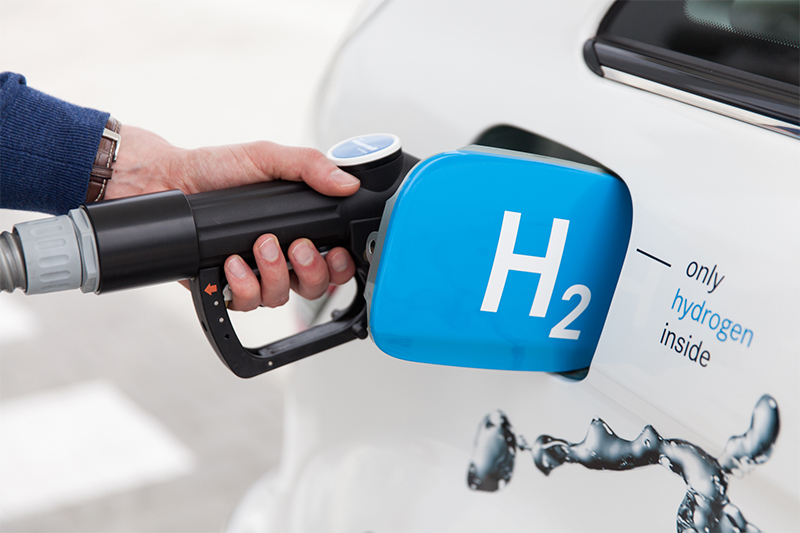
- Joint venture H2 MOBILITY puts further H2 stations into operation
- Fuel-cell vehicles can now refuel at Shell filling station on Katernberger Strasse
- Systems technology by Linde
- Facility supported by European Commission
Drivers of electric cars with fuel cells can refill their tanks at more and more filling stations: The joint venture H2 MOBILITY Deutschland and its shareholders Shell and Linde have now opened another hydrogen (H2) filling station in Essen-Katernberg. A new H2 station simultaneously went into operation in Leverkusen – the ninth and tenth in North Rhine-Westphalia.
Fuel-cell powered electric vehicles run on hydrogen. The advantages: no noise, no pollutants, but the same utility, speed, and range as cars with petrol or diesel engines. Hydrogen vehicles have ranges of 500 to 800 kilometres and can refuel in just three minutes. The facility in Essen was built using Linde technology and can hold 230 kilograms of hydrogen – enough to fuel about 50 vehicles a day.
The network of stations where fuel-cell vehicles can fuel with hydrogen is becoming ever denser: there are currently 62 H2 filling stations in Germany, including in Kamen, Mülheim, Düsseldorf, Ratingen, and Wuppertal. By the end of 2019, there are to be 100; other upcoming openings include Dortmund, Duisburg, and Herten.
The new H2 station on Katernberger Strasse 99 is conveniently located near the Essen-Nord motorway junction, one kilometre from the A42 slip road.
E-mobility with hydrogen reduces CO2 emissions
Hydrogen offers a way to expand the range of fuels available in the transport sector in a climate-friendly way: climate-damaging CO2 emissions can be considerably reduced by using hydrogen produced with renewable energy.
Dr. Christian Bruch, a member of the Linde AG Executive Board, adds: “Hydrogen technology plays a decisive role in the successful spread of electric mobility. Linde technologies ensure high efficiency at all key points in the value chain.”
Nikolas Iwan, Managing Director of H2 MOBILITY Deutschland GmbH, says: “Germany is on its way to becoming a pioneer in electromobility with hydrogen. We are currently building the backbone of the hydrogen infrastructure with the first 100 stations in metropolitan areas as well as along connecting arterial roads and motorways. The details of the expansion are determined by the demand.
The hydrogen station in Essen is funded by the European Commission through the Fuel Cells and Hydrogen 2 Joint Undertaking (FCH 2 JU) in the Hydrogen Mobility Europe (H2ME) project.
About H2 MOBILITY
H2 MOBILITY Deutschland GmbH & Co KG is responsible for the establishment of a nationwide hydrogen infrastructure to supply fuel-cell powered cars (700 bar technology) in Germany. The interim goal by the end of 2019 is to operate 100 hydrogen stations in seven German metropolitan areas (Hamburg, Berlin, Rhine-Ruhr, Frankfurt, Nuremberg, Stuttgart, and Munich), and along the connecting roads and motorways. This will be followed by another 400 hydrogen stations, to ensure a nationwide supply as vehicle numbers are ramped up. H2 MOBILITY is handling all of the operational tasks, including network planning, permitting, procurement, construction, and operation.
H2 MOBILITY’s shareholders are Air Liquide, Daimler, Linde, OMV, Shell, and TOTAL. The company is advised by associated partners BMW, Honda, Hyundai, Toyota and Volkswagen, as well as Germany’s National Organisation for Hydrogen and Fuel Cell Technology (NOW GmbH).
PRESS CONTACTS:
Shell Germany Oil GmbH
Axel Pommeränke, +49 (0) 40 6324 5290, shellpresse@shell.com
Linde AG
Thomas Schaefer, +49 89 7446-2464; thomas.kurt.schaefer@linde.com
H2 Mobility Deutschland GmbH
Sybille Riepe, +49 (0) 170 58 70 317, riepe@h2-mobility.de